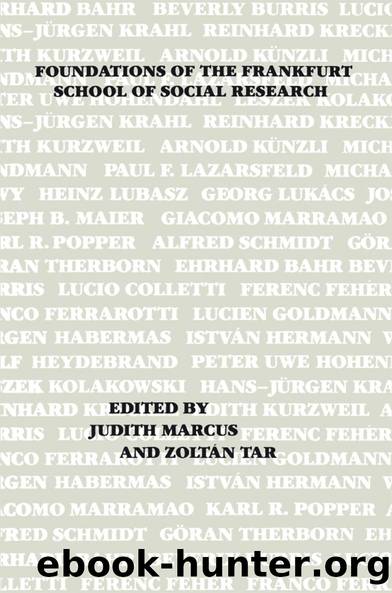Foundations of the Frankfurt School of Social Research by Judith T. Marcus Zoltan Tar

Author:Judith T. Marcus, Zoltan Tar [Judith T. Marcus, Zoltan Tar]
Language: eng
Format: epub
Tags: Political Science, Public Policy, Social Policy, Social Science, General, Sociology
ISBN: 9781000676853
Google: EFDVDwAAQBAJ
Barnesnoble:
Publisher: Routledge
Published: 2020-03-06T00:00:00+00:00
The object of this critique is the neohumanism of Weimar and its glorification of Greek art. This seemingly historical polemic has a methodological aspect which I want to bring to the foreground: Adorno, at least implicitly, speaks here against the model that was used by the early Lukács to situate the novel form. Adorno undercuts the fundamental assumption of Lukácsâs Theorie des Romans that early Greek literature was grounded in social conditions which were free of alienation.
This critique of classicism becomes important because it is at the same time a critique of a model which was further developed by Lucien Goldmann. For Goldmann the task of the critic and sociologist of literature is to establish a homology between the social and the literary structure.8 Adornoâs theory looks similar, yet this similarity is deceptive. While Adorno shares with Goldmann the interest in formal structure and rejects any kind of Inhaltssoziologie as vulgar materialism, he is careful not to press the correlation into the homology model. The difference becomes apparent when Adorno defines his approach as immanent. The critic is starting out from the text rather than beginning with an analysis of the social structure. It is the explication of the work of art which offers insight into the social conditions that defined the production of the work of art. In his essay âRede über Lyrik und Gesellschaftâ he unfolds the notion that the social meaning of the poem is expressed through its language. The poem relates to social history only indirectly. Adorno calls the poem a philosophical and historical sundial; by deciphering the structure of the poem the critic decodes the meaning of social history. Again, this sounds like Goldmannâs theory, but we have to note the distinction: The interpretation of the poem refers to the meaning of history, not to the facts or objective structures. The two realms are mediated by philosophyâmore specifically the philosophy of the early Marx. Unlike Goldmann, Adorno would never identify the work of art with an individual social group or class. This procedure which is typical of Goldmannâs criticism, is unacceptable to Adorno on principle. The correspondence between art and society, the aesthetic and the social meaning, transcends the particular group or class. Authentic are only those works which are representative of the whole. The choice of the sundial as the key metaphor signals that for Adorno the important element in the text is its expressive force and much less the author and his/her intentions to build up a coherent vision of the world. The individual author enters the sphere of criticism only as the human voice, the historical subjectivity that objectifies the expression through the work. Thus the emphasis is placed on the objective side: The authentic work of art is given the status of a permanent testament of human historyâit embodies the hopes and sufferings, the expectations and contradictions of the human race.
In Ãsthetische Theorie Adorno tries to unfold this argument: âIf [the authentic work of art] stands in opposition to empirical reality
Download
This site does not store any files on its server. We only index and link to content provided by other sites. Please contact the content providers to delete copyright contents if any and email us, we'll remove relevant links or contents immediately.
Chaco's Northern Prodigies : Salmon, Aztec, and the Ascendancy of the Middle San Juan Region after AD 1100 by Paul F. Reed(366)
Digital International Relations by Unknown(363)
Law Enforcement Interpersonal Communication and Conflict Management by Brian Douglas Fitch(358)
The Enduring Color Line in U.S. Athletics by Krystal Beamon Chris M. Messer(337)
Critical Perspectives on Human Security : Rethinking Emancipation and Power in International Relations by David Chandler; Nik Hynek(336)
Skilled interpersonal communication: Research, theory and practice, Fifth edition by Owen Hargie(335)
EPSO CAST Political affairs EU policies: How to succeed in the selection procedure by Franco Reverte José María(312)
Evidence-Based Policy Making in Labor Economics by Hamermesh Daniel S.;Nottmeyer Olga K.;Nottmeyer Olga;King Sarah;King Sarah;King Sarah;(309)
Writing Public Policy - A Practical Guide to Communicating in the Policy Making Process by Catherine F. Smith(288)
Criminological Theory in Context by John Martyn Chamberlain(281)
Rothschild and Early Jewish Colonization in Palestine (Geographical Perspectives on the Human Past) by Ran Aaronsohn(278)
Tibeton Yoga Its Secret Doc by Evans-Wentz(277)
Threshold Concepts in Women's and Gender Studies by Christie Launius Holly Hassel(272)
Social Problems, Social Issues, Social Science by James Wright(271)
Positive Psychology and Spirituality in Counselling and Psychotherapy (Conflict, Ethics, and Spirituality, 12) by unknow(269)
Cognitive Development in Infancy and Childhood (Elements in Child Development) by Mary Gauvain(262)
Play in child development and psychotherapy: toward empirically supported practice by Sandra W. Russ(260)
Latin American Politics and Society by Gerardo L. Munck & Juan Pablo Luna(237)
What Makes a Social Crisis?: The Societalization of Social Problems by Jeffrey C. Alexander(227)
